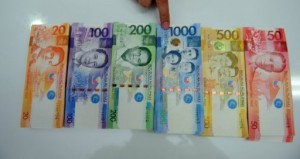Net ‘hot money’ inflows slipped in ’12

Foreign portfolio investments in 2012 hit the highest in a decade as the favorable outlook on the Philippine economy boosted demand by foreigners for peso-denominated stocks, bonds and other financial instruments.
The significant inflow of foreign “hot money” last year came as the Philippines was given better credit ratings, which are now just a notch below investment grade.
The Bangko Sentral ng Pilipinas on Thursday reported that the gross inflow of foreign portfolio investments reached $18.46 billion last year, the highest in a decade. The amount was also up by 12 percent from $16.47 billion in 2011.
“[Growth in foreign hot money] was fueled by renewed interest in securities listed in the Philippine Stock Exchange, coupled with sustained investor confidence on the country’s solid macroeconomic fundamentals,” the BSP said in a statement.
Demand for peso-denominated stocks last year pushed the Philippine Stock Exchange index to record highs.
Meantime, the outflow of foreign portfolio investments from the country grew as well. The BSP said rising liquidity encouraged more locals to invest in foreign currency-denominated instruments.
The outflows reached $14.57 billion, up by 17.5 percent from $12.4 billion the previous year.
Thus, the net inflow of foreign hot money (gross inflows less outflows) reached $3.88 billion, which was down year on year by about 5 percent from $4.1 billion.
The BSP said the rise in foreign portfolio investments is welcome as this helps make the country’s capital markets vibrant.
However, the central bank said hot money could have adverse effects on the economy if these become excessive or if they are not properly managed.
The BSP said portfolio investments that involve speculation on the peso cause volatility of the exchange rate which, it said, is bad for businesses and the economy.
Given this line of thinking, the BSP last year implemented measures aimed at curbing speculative portfolio inflows. If not for the measures, market players believe foreign portfolio investments to the country could have risen even higher.
In early 2012, the BSP imposed a higher capital charge on banks’ holdings of nondeliverable forwards.
In the middle of the year, a regulation prohibiting banks from investing money of foreign clients in the special deposit account facility of the central bank was revived.
BSP Governor Amando Tetangco Jr. has said the central bank is keen on implementing more measures against speculation to help prevent excessive volatility of the exchange rate.
